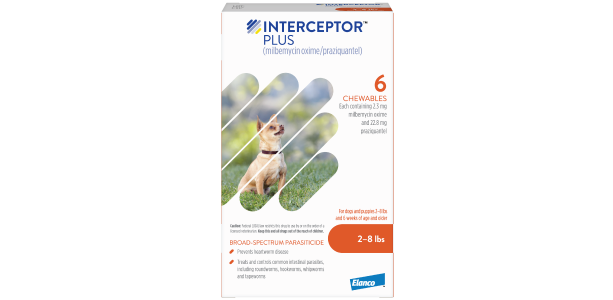Most dog owners have heard of heartworms, but many owners may not be fully aware of the threats heartworms can pose to their dogs. Here’s how to recognize the signs and symptoms of a heartworm infection in dogs.
Heartworms, which are transmitted by mosquitoes and live and grow in your dog’s heart and lungs, can only be diagnosed when they are adults, which typically means after they have been inside your dog for at least four to five months. Knowing how to recognize the symptoms of heartworm earlier can help you get the necessary treatment and care your dog needs faster.
What Are the First Signs of Heartworm in Dogs?
A blood test administered by a veterinarian is the most common way to uncover a heartworm infection. However, you may be able to observe several physical signs of heartworms, including:
- Cough
- Lethargy or inactivity
- Decreased appetite resulting in weight loss
- Heart failure
- Blood in urine
- Collapsing or fainting
Cough
One of the most noticeable symptoms of heartworms in dogs is a cough. You may hear your dog coughing from time to time, especially after exercise. This can also indicate kennel cough, which is similar to bronchitis for dogs. Either way, a visit to the vet will help identify which illness your dog might have.
Lethargy or inactivity
Any time your dog’s activity level or stamina changes, take them to the vet. Because heartworms get into your dog’s heart, it can be difficult for your pet to complete even the easiest activities.
Decreased appetite resulting in weight loss
As the heartworms mature and migrate into the heart and lungs, the dog may lose their appetite. Losing weight may also be a symptom of heartworm disease.
Heart failure
In most cases, a veterinarian is more likely than a pet owner to recognize the signs of heart failure. However, you may notice erratic heartbeats, or your dog’s stomach may get bigger because their abdomen is filling up with fluid.
Other signs of heartworms in dogs
Some dogs will have blood in their urine, and some may even collapse because their hearts are almost completely blocked by the worms.
Remember: Dogs tend to show more obvious symptoms as the heartworms mature, meaning that when you do find out that your dog has heartworms, the infection is probably already serious.
What Should You Do If Your Dog Has Heartworms?
Your veterinarian will administer a series of treatments over the course of several months, and you’ll have to keep your dog calm and limit activity while the worms die off.
Because heartworm treatment can be a difficult and long process for your dog, preventing heartworm infections is the most effective form of treatment. This is why regularly administering a heartworm prevention treatment for your dog is the best way to keep them protected from this serious infection.

Interceptor® Plus (milbemycin oxime/praziquantel)
A monthly chew that protects dogs and puppies 6 weeks or older and 2 pounds or greater against heartworm disease, adult hookworm, roundworm, tapeworm and whipworm infections.

Trifexis® (spinosad + milbemycin oxime)
A beef-flavored tablet that kills fleas and prevents flea infestations, prevents heartworm disease, and treats and controls adult hookworm, roundworm and whipworm infections.

Advantage Multi® for Dogs (imidacloprid + moxidectin)
WARNING: DO NOT ADMINISTER THIS PRODUCT ORALLY. For the first 30 minutes after application ensure that dogs cannot lick the product from application sites on themselves or other treated animals. Children should not come in contact with the application sites for two (2) hours after application. (See Contraindications, Warnings, Human Warnings, Dosage & Administration, and Adverse Reactions for more information.)
Interceptor® Plus (milbemycin oxime/praziquantel)
Indications:
Interceptor Plus prevents heartworm disease and treats and controls adult roundworm, hookworm, whipworm, and tapeworm infections in dogs and puppies 6 weeks or older and 2 pounds or greater.
Important Safety Information:
Treatment with fewer than 6 monthly doses after the last exposure to mosquitoes may not provide complete heartworm prevention. Prior to administration of Interceptor Plus, dogs should be tested for existing heartworm infections. The safety of Interceptor Plus has not been evaluated in dogs used for breeding or in lactating females. The following adverse reactions have been reported in dogs after administration of milbemycin oxime or praziquantel: vomiting, diarrhea, decreased activity, incoordination, weight loss, convulsions, weakness, and salivation. For complete safety information, please see Interceptor Plus product label or ask your veterinarian.
Trifexis® (spinosad + milbemycin oxime)
Indications:
Trifexis prevents heartworm disease. Trifexis kills fleas and prevents flea infestations, and treats and controls adult hookworm, roundworm and whipworm infections in dogs and puppies 8 weeks and older and 5 pounds or more.
Important Safety Information:
The use of ivermectin at higher than FDA-approved doses at the same time as Trifexis can result in serious side effects. Treatment with fewer than three monthly doses after the last exposure to mosquitoes may not provide complete heartworm prevention. Prior to administration of Trifexis, dogs should be tested for existing heartworm infection. Use with caution in breeding females. The safe use of Trifexis in breeding males has not been evaluated. Use with caution in dogs with pre-existing epilepsy. The most common adverse reactions reported are vomiting, decreased activity, itching, decreased appetite, and diarrhea. To ensure heartworm prevention, observe your dog for one hour after administration. If vomiting occurs within an hour of administration, redose with another full dose. Puppies less than 14 weeks of age may experience a higher rate of vomiting. For complete safety information, please see Trifexis product label or ask your veterinarian.
Advantage Multi® for Dogs (imidacloprid + moxidectin)
Indications:
Advantage Multi® for Dogs is a once-a-month topical solution for the prevention of heartworm disease, the treatment of circulating microfilariae, killing adult fleas, the treatment of flea infestations, the treatment and control of sarcoptic mange, and the treatment and control of hookworm, roundworms and whipworms infections in dogs and puppies that are at least 7 weeks of age and that weigh at least 3 lbs.
Important Safety Information:
CAUTION: Federal law restricts Advantage Multi® for dogs to use by or on the order of a licensed veterinarian.
WARNING: DO NOT ADMINISTER THIS PRODUCT ORALLY. For the first 30 minutes after application ensure that dogs cannot lick the product from application sites on themselves or other treated animals. Children should not come in contact with the application sites for two (2) hours after application. (See Contraindications, Warnings, Human Warnings, Dosage & Administration, and Adverse Reactions for more information.) CONTRAINDICATIONS: Do not use this product on cats.

